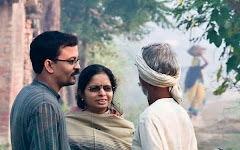https://www.saddahaq.com/politics/gwangju/sweet-dewsince-1980
The Gwangju Biennale, started in September 1995 in the city of Gwangju in the South Jeolla province of South Korea, is Asia's first and most prestigious contemporary art biennale.
Founded in memory of the 1980 civil uprising and the Gwangju Democratisation Movement, the event showcases a global perspective on contemporary art.
Ideas of destruction and renewal lie at the heart of 2014 Gwangju Biennale, one of the world’s best-attended contemporary art festivals. Hosted by the Gwangju Biennale Foundation and the Gwangju Museum of Art, the special project ‘Sweet Dew-since 1980’, is a combination of lectures, exhibitions,and performances. All this is done to create a new platform for discourses on visual cultures.
As a part of this project, the lecture series will seek to analyse the current state of reality in Korea, Asia, Europe, and the United States through testimonies and debates over issues of energy and environmental crises; the spread of neo-liberalism; transformation of the relations between capital, labour, and the arts and the ongoing violence perpetrated by the state and threat to democratic values. This lecture series not only tries to understand our present reality, but also to articulate our desires for the future and form the basis of the forthcoming Gwangju Manifesto.
Open to the public from September 5- November 9, the event has the theme 'Burning down the House'.
The works on exhibition explore subjects that challenge the status quo, including that of labour and gender issues as well as a loss of folklore traditions in Asia’s contemporary commodity culture, according to artistic director Jessica Morgan. The theme is a nod to a song by US. art-rock group the Talking Heads.
I, Lenin Raghuvanshi (Leader of the social Movement for the untouchable people, India), am going to present my paper titled ‘Crisis of democracy and the Caste System in India’ during the International symposium on ‘Globalisation and the Crisis of Democracy’. Similarly the other panelists for the symposium on 19 September are: Young-Suk Lee (Professor of English Language and literature Gwangju University, Korea), Peter Bohmer (Professor of Economics at Evergreen State College, US), Michalis Spourdalakis (Professor of Political Science at University of Athens, Greece), Pyeong-Eok An (Professor of International Relations at Daegue University, Korea), Ken Ishida (Professor of History of International Politics at Chiba University, Japan), Jie-Hyun Lim (Professor of History at Hanyang university, Korea) and Michael Kim (Professor of International Studies at Yonsei University, Korea).
In my paper, I write, “India is a land of diversity with a great and long history populated by many different peoples, from many different origins, and who have many different religious, political and philosophical views. Many abuses are committed against peoples due to their caste or their religion and nature is more and more systematically ransack for privates interests."
The main problems facing the country came from two things. First is the implementation of a ‘culture of impunity based on mind of caste with silence’, which arose from a shared belief that a few can act without being accountable for their actions, be it at the social, economic or political levels. Secondly, the problems arose from the meeting of this cognitive problem with the market democracy and economic globalisation.”
Rabindranath Tagore puts it the right way in Geetanjali:
Where the mind is without fear
and the head is held high;
Where knowledge is free;
Where the world has not been
broken up into fragments
by narrow domestic walls; ...
Where the clear stream of reason
has not lost its way into the
dreary desert sand of dead habit; ...
Into that heaven of freedom,
my Father, let my country awake.
Details about Gwangju Biennial 2014:
Official patrons:
Ministry of Foreign Affairs / Ministry of Education, Science and Technology / Ministry of Culture, Sports and Tourism / Ministry of Security and Public Administration / Korea Customs Service / Gwangju Metropolitan Office of Education
Official sponsors:
Gwangju Shinsegae Department Store / Kwangju Bank / Asiana Airlines / Kumho Buslines
Promotional sponsors:
Shinhan Card / Ramada Plaza Gwangju / Holiday Inn Gwangju / Kumho Resort / Gwangju Family Land / Joongwoe Happy Land / SK Planet / Korail / Gwangju Convention & Visitors Bureau / WeMakePrice / Bohae
Artist commissions:
The International Production Fund 2014: Outset USA, Outset England, Outset Netherlands, NEON Organization for Culture and Development, D. Daskalopoulos / PKM Gallery / Fondation Saradar / Naver / Laura Rapp and Jay Smith / Dakis Joannou / Fundació Per Amor a L’Art / Yana and Stephen Peel / Ross Sappenfield / SBS Culture Foundation / National Museum of Modern and Contemporary Art, Korea / Gallery Koo / Academy of the Arts of the World, Cologne / Maryam Eisler / Fondation Nationale des Arts Graphiques et Plastiques, Paris-France, FNAGP
Institutional support:
Naver Corporation / SAHA Association / British Council / Institut Français / Canada Council for the Arts
National Arts Council Singapore / Japan Foundation / Acción Cultural Española, Gobierno de España / US Embassy Seoul
Links for more information:
https://www.youtube.com/watch?v=19D5Aw8N8pA
http://blogs.wsj.com/korearealtime/2014/09/05/scorched-art-explores-destruction-rebirth-in-gwangju/
http://en.wikipedia.org/wiki/Gwangju_Biennale
http://www.independentsbiennial.org/2014/08/31/gwangju-biennale-4/


